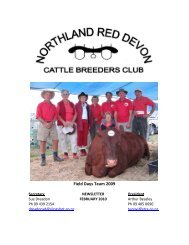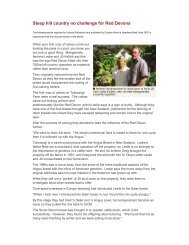Members List - NZ RED DEVON CATTLE BREEDERS ASSOCIATION
Members List - NZ RED DEVON CATTLE BREEDERS ASSOCIATION
Members List - NZ RED DEVON CATTLE BREEDERS ASSOCIATION
Create successful ePaper yourself
Turn your PDF publications into a flip-book with our unique Google optimized e-Paper software.
An A2 issue with the Red Devon’s<br />
As one of the Red Devon breeders has asked me about<br />
the A2 issue (or that lack of A2) he had heard we were<br />
dealing within the Devon breed I thought I would put pen<br />
to paper so all those in the Red Devon Association can<br />
have some information at their fingertips and then they<br />
can decide what they want to do with it – if anything!<br />
Some of you may have heard through the grape vine we<br />
have been steadily converting our dairy herd to carry just<br />
the A2 gene since starting after the year 2000. At that<br />
time we thought there might be a niche market for A2<br />
milk so we decided to gene screen each year’s crop of<br />
calves. So from the year 2000 onwards we have only<br />
used bulls that are listed as A2A2. Over time, as cows<br />
(that were either A1A1 or A1A2) left the replacements<br />
entering the herd were only A2A2 as we sold the A1A2<br />
and A1A1 heifers. Any Jersey bulls that we reared were<br />
also only A2A2. Each year there was less testing to do<br />
and eventually you get a herd that is totally A2. The<br />
trouble with our herd is that we have cows that make it to<br />
teenagers (unlike the modern dairy herd operator that<br />
doesn’t like anything over 6 years old - in fact with the<br />
empty rates these days most of the herds are very young<br />
in age). Due to the lack of niche market to sell pure A2<br />
milk (our herd is too small and the company that markets<br />
A2A2 milk would only have been interested to pick up<br />
the milk if it was a 300 cow farm back then) - there has<br />
been no reason for us to cull the last handful of good<br />
producing cows that carry the A1 genes any quicker. So<br />
we have been using natural attrition for these cows - as<br />
they age and have to be replaced they leave the herd. We<br />
do however just drink A2 milk as we know the A2 cows<br />
and just milk one into a test bucket for our own<br />
consumption during the dry period.<br />
However, as it seems that few people in <strong>NZ</strong> have wised<br />
up about the A2 issue - this little niche market hasn’t<br />
fired up here but has in Australia and there is growing<br />
interest in Canada, the USA and also the UK. This is a<br />
great pity as it is a lost opportunity here in <strong>NZ</strong> and there<br />
are certainly consumers with a particular genetic make-up<br />
who cannot “handle” A1 contaminated milk. I feel it was<br />
a grave mistake that Fonterra decided not to encourage<br />
farmers to switch to using only A2 bulls which would<br />
have quietly and gradually moved the New Zealand<br />
genetics to predominantly A2 so that most milk would be<br />
A2 milk. I fear that ignoring the health issues that can<br />
result from consuming A1 milk will come back to haunt<br />
the industry in the years to come and no doubt ultimately<br />
this will be to the dairy farmer’s cost not only in lost<br />
market access but to likely court costs.<br />
I digress. Back to A2 and Devon’s – what is the issue?<br />
Well I am going to stick my neck out and say the news is<br />
not good. The limited testing I have done on Devon<br />
cattle has revealed to my consternation that the breed has<br />
the undesirable A1 gene. I have done sampling in three<br />
herds and find A1 very prevalent – in fact in one herd all<br />
the cattle I tested that day didn’t have a single A2 allele.<br />
This is not good as if word gets out around the world<br />
about this A1 gene being very prevalent in the Devon<br />
cattle breed. In my view it is another undesirable or real<br />
potential problem with the breed as those countries<br />
around the world that have taken or are taking the trouble<br />
to clean up their genetics will not want to purchase<br />
products (and that includes semen) from countries that<br />
still have the A1 gene present in their stock.<br />
OK, so I hear you say, “So what”? “You don’t drink<br />
Devon milk”! Well, I am sure some people do in some<br />
parts of the world as they were once a dual purpose<br />
breed. The problem is if the Devon animal has the A1<br />
gene present then ALL the cells in its body have the A1<br />
gene present – this means the MEAT! Have I got your<br />
attention now?<br />
I have a sister whose child could not handle standard milk<br />
brought from the local corner dairy which was being fed<br />
when she returned to the work force. I kept telling her<br />
that she must try A2 milk. I even offered to freeze some<br />
of our milk and send it by courier from Thames to<br />
Palmerston North! In the end she did ask her local dairy<br />
to get a bottle of A2 milk in for her. What a revelation!<br />
She was expecting the normal screams soon after feeding<br />
this milk to her child and nothing happened! There were<br />
other mothers in her pre-natal group that had similar<br />
problems with their children and they switched to A2<br />
milk and found the problems disappeared when fed A2<br />
milk. The issue wasn’t lactose intolerance but intolerance<br />
to the A1 or type of casein in the milk. Suddenly the<br />
corner dairy store had to stock another line of milk<br />
especially for these mothers. So the health issues from<br />
A1 contaminated milk are real as these infants cannot<br />
fake these adverse reactions. Human breast milk is all<br />
A2 and so is goat milk.<br />
Now let’s take this thought along a bit further. You feed<br />
an infant milk and it gets colic -there is a clear association<br />
between giving the infant milk and an adverse reaction<br />
therefore you have this gut feeling that it was highly<br />
likely that the milk was the cause of the problem.<br />
Another unknown at this stage is whether the A1 gene<br />
content of meat could also cause adverse effects on<br />
consumers like the A1 milk. Obviously, to date there is<br />
no evidence that there could be an intolerance to eating<br />
meat from A1 cattle – it is just a hypothesis I put forward.<br />
I discussed this issue with Professor Woodford he says to<br />
his knowledge no one is trialing or even looking at this<br />
issue at this time. However, new research from Poland<br />
has found that the molecule bovine BCM7 that causes<br />
adverse reactions that comes from the digestion of A1<br />
milk has been found in human milk and these researchers<br />
now believe this gets there by the lymph system so the<br />
latest guidelines for those mothers who have children<br />
who are intolerant of A1 milk is to:<br />
• feed A2 milk or keep the child on breast milk<br />
• if possible get A2 goat or bovine baby formula<br />
and<br />
• the mothers should only drink A2 milk.<br />
It will be interesting to see in the future if another<br />
guideline is added to the list to avoid A1 meat as well.<br />
Now, what about meat tenderness and A2? I have come<br />
across a posting on the internet of some trial work done<br />
by an Australian based researcher – Gerald Wyatt from<br />
Classic Livestock Management Services who links meat




